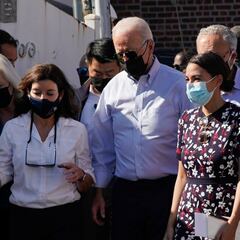Why won't states extend unemployment benefits, as was proposed by Biden?
The additional federal jobless support ended on 6 September but states are refusing to extend the support, despite Biden's suggestion that some should.


At the start of September the White House and Congress allowed a number of key additional unemployment support programmes, many of which had been in place since the start of the pandemic, to expire without being renewed.
Among them were the Pandemic Unemployment Assistance (PUA); the Pandemic Emergency Unemployment Compensation (PEUC); and the Federal Pandemic Unemployment Compensation (FPUC). However the Biden adminstration made clear that states could reinstate the programmes if their employment situation had not improved.
A statement authored by Secretary of the Treasury Janet Yellen and Secretary of the Department of Labor Martin Walsh last month reads: “There are some states where it may make sense for unemployed workers to continue receiving additional assistance for a longer period of time, allowing residents of those states more time to find a job in areas where unemployment remains high.”
Read more
- Unemployment benefit claims increased just as federal programs ended
- AOC releases plan to extend federal unemployment benefits
- How many monthly Child Tax Credit payments are remaining?
It continues: “The Treasury Department is re-affirming that states can use their allocations of the $350 billion in American Rescue Plan State and Local Fiscal Relief Funds to provide assistance to unemployed workers, including by continuing to provide additional weeks of income support to workers whose benefits expire on September 6th.”
But so far not a single state has opted to do so. The hundreds of billions of support for states does not look likely to be used on additional unemployment benefits, but why not?
States unwilling to spend relief funds on unemployment benefits
The underwhelming August jobs report brought fresh concern about the unemployment situation in the United States, with the economy adding only around one-third as many jobs as had been expected. President Biden has blamed the sluggish numbers on the growing threat of the Delta variant, making businesses wary of hiring new staff.
With this in mind you may expect states to be beefing up their unemployment support but that does not seem to be the case. In more than half of all states, the governors actually chose to opt out of the federally-funded benefits programmes before their 6 September expiration.
Texas Gov. Greg Abbott, for example, argued that the more generous unemployment compensation was encouraging people to stay at home and was actually harming the state’s economic recovery. This was the claim made by the majority of states who opted out of the additional unemployment benefits, but why have others resisted introducing their own programmes?
We’re introducing a bill to extend all federal pandemic unemployment insurance through Feb. 1. Benefits would be retroactive to Sep. 6.
— Rep. Alexandria Ocasio-Cortez (@RepAOC) September 15, 2021
We can’t let pandemic unemployment assistance lapse when we’re still recovering from the cost effects of the pandemic. https://t.co/su5iGSw5vk
Although Biden has pointed to the $350 billion for state, local, and tribal governments which was provided by the American Rescue Plan, those funds were provided to states in March and many will have already spent, or at least planned to spend, the money.
Related stories

Will AOC’s bill extend pandemic unemployment insurance until 2022?

In which states did unemployment claims increase last week?
H. D. Palmer, spokesman for California’s Department of Finance, has confirmed to the Sacramento Bee: “There are no remaining funds available from that federal appropriation to be allocated.”
In many instances the cost of extending the programmes is simply too much for states to countenance after 18 months of pandemic-related economic disruption. Andrew Stettner, an unemployment insurance expert at The Century Foundation (TCF), told Yahoo Money that the larger states like New York or California it would have to spend several billion dollars just to continue the additional benefits programmes for a couple of months.